An acrimonious political divide has reportedly erupted within Cabinet over whether to give struggling Lesotho Electricity Company (LEC) a M700 million bailout to avoid load shedding during the crucial maintenance at ‘Muela Hydropower Station.
This is after the LEC appealed to government for a bailout to clear its ballooning debts to suppliers. The company has also requested an additional M300 million to purchase bulk electricity from South Africa’s Eskom to enable it to keep the country’s lights on.
The funds are deemed critical in mitigating the anticipated power shortfall during the ongoing maintenance at the ‘Muela Hydropower Station. The six-month exercise started from the beginning of this month and is expected to be completed in March 2025.
But some cabinet members have reportedly opposed the bailout, arguing that it would reward mismanagement at the LEC and set a dangerous precedent. However, other ministers insist it is a necessary measure to avoid widespread blackouts.
theReporter has it on good authority that tensions over the LEC bailout reached fever pitch during a recent cabinet sitting.
Sources said opposition to the bailout was fuelled by the ongoing legal battle between minister of energy, Professor Nqosa Mahao, and the LEC board of directors.
The clash has reportedly driven a wedge between Cabinet members as they contemplate the implications of rescuing a company with questionable leadership and oversight.
A cabinet member from the ruling Revolution for Prosperity (RFP) said debate over the bailout heated on September 17, where some ministers including him were opposing the bailout. They cited it would be irresponsible of the government to “throw money into a company that has demonstrated a flagrant disregard for financial discipline and good governance”.
The minister indicated that LEC has a track record of mismanaging public funds, and he therefore could not, in good conscience, support the bailout.
“While I understand the severity of the situation and the need to prevent loadshedding, we (government) cannot allow ourselves to be held hostage by a company that has failed to act in the best interests of the country,” he noted.
Another minister told this publication on condition of anonymity that it would be irresponsible to throw money at “a company that has demonstrated a flagrant disregard for financial discipline and good governance”.
He said rather than pouring money into a sinking ship, government should be investing in long-term solutions that will address the underlying issues at the power utility, like appointing an independent commission to investigate the mismanagement and recommend appropriate corrective measures.
The sources added that while cabinet decision-making was generally based on consensus, the prime minister can utilise his executive powers to push through a decision if he deems it necessary, even if the majority of cabinet members disagree.
“A decision has not been made yet and there is no voting that has been done. Even though there can be a cabinet consensus; it is entirely the prime minister’s decision to make a call at the end.
“Although that could paint a bad image of our government for allowing the taxpayers to shoulder the burden of a company’s financial woes when there has been no effort to hold its leadership accountable, this has already caused serious tension among us,” a source pointed out.
Contacted for comment this week, government spokesperson Thabo Sekonyela said only Prof Mahao could comment on whether the cabinet had approved the bailout proposal for LEC.
“The minister of energy is the only person who can provide information on the status of the bail out proposal,” Sekonyela stated.
Efforts to get a comment from Prof Mahao this week were fruitless as his mobile phone rang unanswered.
However, Prof Mahao has told theReporter in an exclusive interview on September 12, that LEC owed M700 million as of August, to its key power suppliers. Eskom is owed about M150million, Electricidade de Moçambique (EDM) of Mozambique M95million and a local energy company run by the Lesotho Electricity General Company (LEGCO), Ramarothole Solar Power Generation, an estimated M43million.
The debt also includes an outstanding amount of about M235million owed to the ‘Muela Hydropower Station, the country’s primary electricity source.
LEC is also behind on its levies to the Lesotho Water Authority (LEWA) with about M60million.
The utility further owes other private companies M30million for various services and products, the minister added.
On August 27, Prof Mahao issued 13 LEC board of directors with letters, asking them to show cause why he cannot remove them from the LEC management.
He accused them of approving millions in staff bonuses while the power utility was deeply indebted to its power suppliers.
Eight of the 13 board members; ‘Mathapelo Ramakatane, Mosiea Mapota, Mokhoenene Lehohla, Molibeli Taele, Mokhethi Seitlheko, Pesha Shale, Seretse Mohlouoa and Khotso Nthontho challenged the minister’s decision in the High Court on August 29.
Respondents in the case were Prof Mahao, the government, and Attorney General, Rapelang Motsieloa.
In their application, the eight seek the court to declare their planned firings illegal, claiming Prof Mahao cannot exercise his political or ministerial powers over a private company.
In his responding affidavit filed on September, Prof Mahao levelled damning allegations against the 13 LEC board of directors, painting a portrait of a company rife with mismanagement and misappropriation that had resulted in a financial crisis.
Prof Mahao indicated that the LEC’s financial report to the cabinet in August revealed that the company owed M712 576 648.04 to suppliers. He stated that the board members were unfit to continue running the LEC on behalf of the government.
According to him, the financial strain was exacerbated by the upcoming ‘Muela outage, for which the LEC has requested M300 million in support to cover the resulting shortfall.
Prof Mahao further noted in his affidavit that despite the LEC’s financial crisis, the board made a decision to pay bonuses to staff which the power utility could hardly afford, adding that the board members were unfit for purpose and had taken the decision to fire them.
“The show cause process was undertaken after the presentation, on the 1st day of August 2024, by the LEC to the cabinet regarding the prevailing financial situation within the LEC, the ‘Muela outage, and LEC proposal for financial assistance of over M300 million to cover shortage that will be caused by the `Muela outage,” Prof Mahao said in his papers.
He added it emerged during that presentation that LEC was in a dire financial situation as it owed suppliers. It was, thus, obvious that the affairs of the LEC were not properly managed and as a result, the shareholder was entitled to invoke the provisions of Section 45 of the Act (Companies Act 2011).
In so doing, it was incumbent upon the shareholder to request that representations be made to determine whether or not to remove the members of the board of directors. Despite the dire financial situation, LEC made bonus payments to the staff, Prof Mahao adds.
He further showed in his affidavit that the situation was so bad that if not attended urgently, the country should brace for power blackouts.
“The LEC is in a dire financial situation which has to be arrested urgently to avoid power cuts as well as to enable the ‘Muela outage to be dealt with urgently. These situations, including a need for financial assistance to the LEC, demand that issue of removal or non-removal of the members of the board be determined on an urgent basis, if not there will be a natural disaster.”
Minister of finance and development planning, Retšelisitsoe Matlanyane this week denied to comment on whether her ministry would issue the bailout.
“I am not at liberty to discuss such government issues,” she told this publication over the phone.









